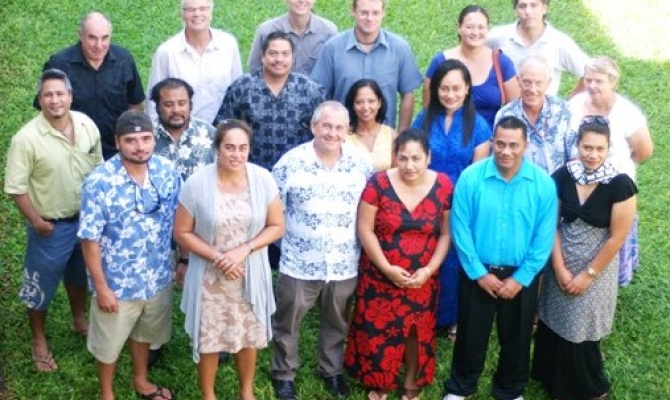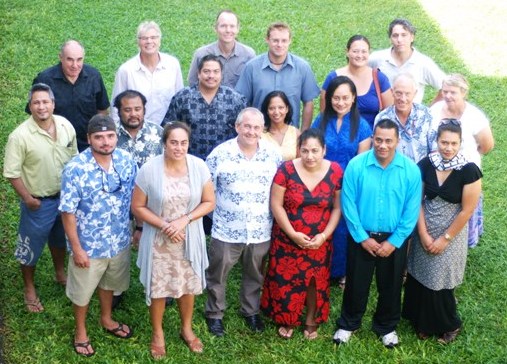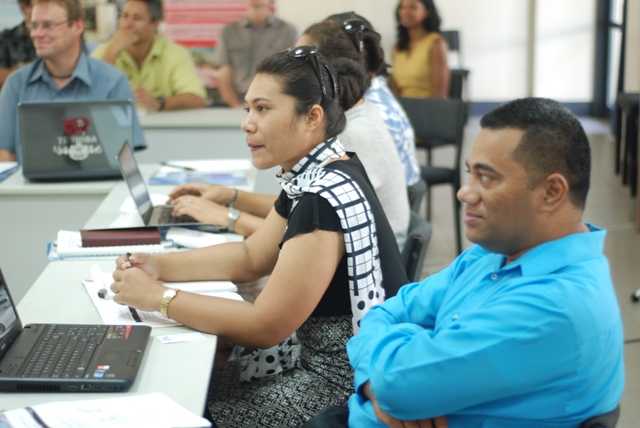
A USD 1.7 million dollar project to conserve island biodiversity in the Cook Islands, Nauru, Tonga and Tuvalu was launched at the Secretariat of the Pacific Regional Environment Programme (SPREP) in Apia, Samoa.
Under this three year initiative the island nations will carry out a range of activities with their local communities to produce and strengthen management actions to save threatened species and ecosystems; and to help ensure sustainable use of natural resources.
The Integrated Island Biodiversity project is funded by the Global Environment Facility, Pacific Alliance for Sustainability (GEF-PAS), implemented by UNEP and executed by SPREP.
Representatives from the Cook Islands, Nauru, and Tonga have gathered to further develop results based plans to strengthen the implementation of their national projects as well as to learn more about the administration, monitoring and reporting arrangements for the project in an inception workshop in Apia, this week.
In his address to the participants, the Director-General of SPREP highlighted three key points to guide the progress of the project to success; learn from the past and look to the future; develop synergies and partnerships and to; ensure the work plan and budget for this project is focused and achievable.
"It is important that you focus on priorities and that actions identified in work plans developed this week are practical and achievable," said Mr. Sheppard.
"It is also essential that project activities are implemented effectively and successfully. SPREP with partners will provide as much support as we can in this area."
Three of the worlds' biodiversity hotspots occur in the Pacific islands; these are places that hold high numbers of endemic species. While we may have unique ecosystems in our region, ensuring they are preserved and protected is an ongoing challenge.
This new Island Biodiversity project will help ensure the Cook Islands, Nauru, Tonga and Tuvalu can have activities on the ground that uses an integrated Ecosystem-based management approach which entails emphasizing the connectivity between systems such as between land and sea and people.
"We are glad to see this project come to fruition," said Dr Greg Sherley, Task Manager Biodiversity Conservation of UNEP.
"Knowing the history of this project and the commitment from people to prepare and bring this project together makes this a very special occasion. I'm really encouraged by all the partners involved with this project as I know all are committed to helping you make it a success."
Saving our Pacific biodiversity is crucial. The authoritative Red List of the International Union for Conservation of Nature confirms that many plant and animal species are in crisis: that one bird out of eight, one mammal out of four, and six marine turtles out of seven are threatened with extinction.
"Our mission is that people need nature to thrive," said Michael Donoghue Director of Conservation International Pacific.
Conservation International Pacific, through the Critical Ecosystems Partnership Fund is a key partner in this project, providing co-financing support.
"We believe that the protection and preservation of natural capital is the most important challenge facing humankind. Nowhere on the planet is that more important than in the Pacific islands which is heavily impacted by climate change and invasive species."
The workshop is held from 8 – 11 May, 2012 and consists of participants from partner organisations as well as from the Cook Islands, Nauru and Tonga. A similar workshop will be held specifically for Tuvalu.
For more details please contact Mr. Gianluca Serra, the GEF project facilitator.

